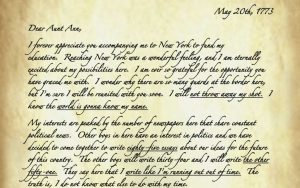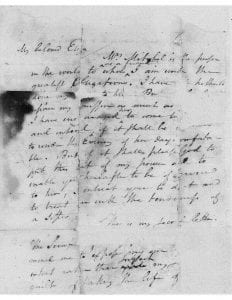By: Adair Garrett
The revision process of this project helped my project grow to become stronger and more informative. Upon first reading through the comments, I was surprised by my peer reviewer’s understanding of my piece. Multiple times he commented on how “dark” my piece was, which was interesting to me because most of the facts I included came straight from news that had been published within the past two months. After receiving comments from my peer reviewer, I immediately began editing my letters. He noted that I had a few grammatical errors, which I took care to correct quickly, but I waited two days before going through and addressing the rest of his comments. As suggested in class, reading through the comments at first left a certain impression – and triggered my impulse to defend my work – but time encouraged me to be more open to implementing some of the suggestions.
I didn’t agree with his idea to change the letters to specify an intended audience. My peer reviewer asked whether I intended to write both for immigrants and for the families of immigrants living outside the US. I did not change anything in my work as a response to this question because my intention was to write this for anyone whose lives have been touched by the detainment or deportation of immigrants. He also noted that the use of Hamilton lyrics throughout the letters may impact the span of the audience. Here, I agreed; I knew that incorporating lyrics within the letters would drive the story to be told a different way, but I also wanted to pull as much from Hamilton as I could to make it more of a “remix”.
My peer reviewer left many comments that I did apply. His questions drove me to reflect on my own project and how I could make the project better. My peer reviewer suggested that I add a letter written from Ann Mitchell to Hamilton, stating that it would add to my project if “two sides of an overall story” were included. Upon this suggestion, I read over again my draft and decided he was right, even though it required me to do more research about Ann Mitchell and about news stories I could pull from. I added a letter from Ann Mitchell but did not include lyrics from the musical in her letter because she did not have a role in the musical that I could draw from, and there was no character that mirrored her position in Hamilton’s life. I decided to leave her letter empty of references to the lyrics within the musical and focused on making sure her letter relayed the difficulty in communication faced by parents of detained immigrant children. I also wanted to include historical information of Ann Mitchell’s life since her role was left unmentioned by the musical.
I continued to make changes after adding the letter from Ann Mitchell. I tried to edit the letters so they could be a stronger means to make my argument about the similarities between the themes of the musical and the news stories of today. I decided to add references throughout the document so audience members could refer to the article that lead me to make a claim (this was a continued response to my peer reviewer’s comment that my take on the news was so dark). I also wanted to take the form of the document and put it into a more interactive and aesthetic form. After asking for suggestions from many people, I received the advice to use the templates for medieval-themed video game manuals. When I formatted my project onto the letters, however, I lost the citations. I decided that I would keep the formatted documents as they were (without the references) and turn in both the PDF of the old, handwritten letters as well as a PDF of the original document including the references. This way, I kept the aesthetic of a handwritten letter while citing the appropriate information in the original document.
Here is an example of my final product:

Or you can check out my entire project:












